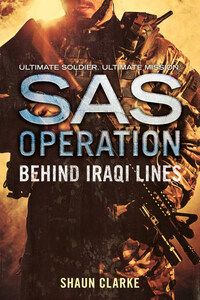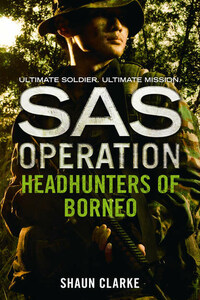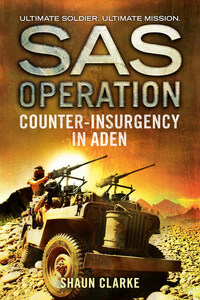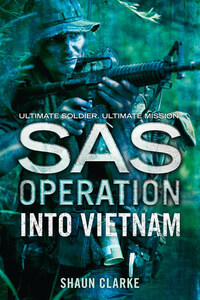Published by HarperCollinsPublishers Ltd
1 London Bridge Street
London SE1 9GF
www.harpercollins.co.uk
First published in Great Britain by 22 Books/Bloomsbury Publishing plc 1993
Copyright © Bloomsbury Publishing plc 1993
Cover layout design © HarperCollinsPublishers Ltd 2016
Cover photographs © StudioThreeDots/Getty Images (soldier); Shutterstock.com (textures)
Shaun Clarke asserts the moral right to be identified as the author of this work.
A catalogue copy of this book is available from the British Library.
This novel is entirely a work of fiction. The names, characters and incidents portrayed in it are the work of the authorâs imagination. Any resemblance to actual persons, living or dead, events or localities is entirely coincidental.
All rights reserved under International and Pan-American Copyright Conventions. By payment of the required fees, you have been granted the non-exclusive, non-transferable right to access and read the text of this e-book on screen. No part of this text may be reproduced, transmitted, down-loaded, decompiled, reverse engineered, or stored in or introduced into any information storage and retrieval system, in any form or by any means, whether electronic or mechanical, now known or hereinafter invented, without the express written permission of HarperCollins.
Source ISBN: 9780008141325
Ebook Edition © November 2015 ISBN: 9780008154837
Version: 2015-10-15
Just after two in the morning the Kuwaiti Customs and Immigration officials playing cards at a table in the concrete administration office of the Al-Abdaly checkpoint were distracted by a rumbling sound approaching from the border of Iraq. Lowering their cards and removing their cigarettes from their lips, they glanced quizzically at one another as other officials, who had been dozing at their desks, were awakened by the increasing noise.
The floor began shaking beneath the menâs feet. At first bewildered, then slowly realizing that the unthinkable might be happening, the senior official, an overfed, jowly man in a dusty, tattered uniform, dropped his cards onto the table, stood up and walked to the door. By the time he opened it, the whole building was shaking and the distant rumbling was rapidly drawing nearer.
The Customs official looked out of the doorway as the first of a convoy of 350 Iraqi tanks smashed through the wooden barriers of the checkpoint. Shocked almost witless, he dropped his cigarette and stared in disbelief as one tank after another rumbled past, noisily smashing the rest of the barrier and sending pieces of wood flying everywhere.
Fear welled up in the official when he saw shadowy figures in the billowing clouds of dust created by the tanks. Realizing that they were armed troops advancing between the tanks, he slammed the door shut, bawled a warning to his colleagues, then raced back to his desk to make a hurried telephone call to Kuwait City, informing his superiors of what was happening.
He was still talking when the rapid fire of a Kalashnikov AK47 assault rifle blew the lock off the door, allowing it to be violently kicked open. Iraqi troops rushed in to rake the room with their weapons, massacring all those inside and â more important from their point of view â blowing the telephones to pieces.
As the spearhead of Saddam Husseinâs military machine rumbled along the 50-mile, six-lane highway leading to Kuwait City, troops were dropped off at every intersection to capture Kuwaitis entering or leaving. Other troops disengaged from the main convoy to drag stunned Kuwaiti truck drivers from their vehicles and either shoot them on the spot or, if they were lucky, keep them prisoner at gunpoint.
Simultaneously, Iraqi special forces, airlifted in by helicopter gunships, were parachuting from the early-morning sky to secure road junctions, government buildings, military establishments and other key positions in the sleeping capital.
Moving in on the city, still out of earshot of most of those sleeping, were a million Iraqi troops, equipped with hundreds of artillery pieces, multiple-rocket launchers, and a wide variety of small arms. Stretched out along a 200-mile front, obscured by clouds of dust created by Saddam Husseinâs five and a half thousand battle tanks, they endured because they were motivated by months of starvation and their growing envy of Kuwaiti wealth.
In air-conditioned hotels, marble-walled boudoirs and lushly carpeted official residences, the citizens of Kuwait were awakened by the sound of aircraft and gunfire from the outskirts of the city. Wondering what was happening, they tuned in to Kuwait Radio and heard emergency broadcasts from the Ministry of Defence, imploring the Iraqi aggressors to cease their irresponsible attack or face the consequences. Those who heard the broadcasts, Kuwaitis and foreigners alike, went to their windows and looked out in disbelief as parachutists glided down against a backdrop of distant, silvery explosions and beautiful webbed lines of crimson tracers. It all seemed like a dream.














